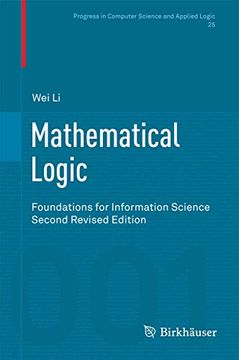Share
Mathematical Logic: Foundations for Information Science (in English)
Wei Li
(Author)
·
Birkhauser
· Hardcover
Mathematical Logic: Foundations for Information Science (in English) - Li, Wei
$ 52.09
$ 54.99
You save: $ 2.90
Choose the list to add your product or create one New List
✓ Product added successfully to the Wishlist.
Go to My WishlistsIt will be shipped from our warehouse between
Friday, June 21 and
Monday, June 24.
You will receive it anywhere in United States between 1 and 3 business days after shipment.
Synopsis "Mathematical Logic: Foundations for Information Science (in English)"
Mathematical logic is a branch of mathematics that takes axiom systems and mathematical proofs as its objects of study. This book shows how it can also provide a foundation for the development of information science and technology. The first five chapters systematically present the core topics of classical mathematical logic, including the syntax and models of first-order languages, formal inference systems, computability and representability, and Gödel's theorems. The last five chapters present extensions and developments of classical mathematical logic, particularly the concepts of version sequences of formal theories and their limits, the system of revision calculus, proschemes (formal descriptions of proof methods and strategies) and their properties, and the theory of inductive inference. All of these themes contribute to a formal theory of axiomatization and its application to the process of developing information technology and scientific theories. The book also describes the paradigm of three kinds of language environments for theories and it presents the basic properties required of a meta-language environment. Finally, the book brings these themes together by describing a workflow for scientific research in the information era in which formal methods, interactive software and human invention are all used to their advantage.The second edition of the book includes major revisions on the proof of the completeness theorem of the Gentzen system and new contents on the logic of scientific discovery, R-calculus without cut, and the operational semantics of program debugging. This book represents a valuable reference for graduate and undergraduate students and researchers in mathematics, information science and technology, and other relevant areas of natural sciences. Its first five chapters serve as an undergraduate text in mathematical logic and the last five chapters are addressed to graduate students inrelevant disciplines.
- 0% (0)
- 0% (0)
- 0% (0)
- 0% (0)
- 0% (0)
All books in our catalog are Original.
The book is written in English.
The binding of this edition is Hardcover.
✓ Producto agregado correctamente al carro, Ir a Pagar.

